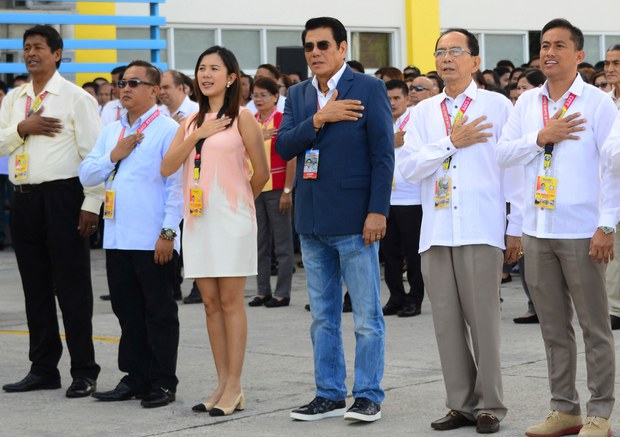Sniper Fire Kills Philippine Mayor Known for Parading Suspected Criminals
2018.07.02
Manila
 Antonio Halili (third from right), mayor of the Philippine city of Tanauan south of Manila, attends a flag-raising ceremony minutes before he was shot dead apparently by sniper fire outside the municipal hall in Batangas province, July 2, 2018.
Antonio Halili (third from right), mayor of the Philippine city of Tanauan south of Manila, attends a flag-raising ceremony minutes before he was shot dead apparently by sniper fire outside the municipal hall in Batangas province, July 2, 2018.
A controversial Philippine mayor known for parading suspected criminals but who was stripped of his powers to supervise the city’s police force last year due to his alleged drug links was killed Monday in front of hundreds of horrified employees, police said.
Antonio Halili, mayor of Tanauan City in Batangas province south of Manila, was attending the flag-raising ceremony in a parking lot outside the city hall when a sniper’s bullet pierced his chest, sending the crowd into panic, officials said.
“It appears the gunshot was from a sniper,” regional police chief Edward Carranza told reporters. “Our crime laboratory officials are now here to secure the grounds beside the city hall.”
The brazen attack, caught live on cellphone video being played by the city staff on Facebook, showed people scampering for safety while at least six shots rang out during the melee. It was unclear if all the shots were directed at the mayor or his bodyguards fired in return.
The unidentified gunman was able to escape, police said.
Authorities immediately formed a special investigation task group to look into the killing and determine the shooter’s motive.
Presidential spokesman Harry Roque condemned Halili’s killing and described him as a strong supporter of President Rodrigo Duterte’s war on drugs.
“He was a good mayor and strong supporter of the president’s war on drugs,” Roque said as he promised Halili’s family of justice. He also cautioned the public against engaging in speculation on the killing, even as authorities have yet to conclude their investigation.
While Halili was known for his tough anti-crime stunts, he had also been accused by police of protecting drug lords. Halili, who denied the allegations about his drug links, was famous for parading around town suspected criminals, including drug addicts, in his “shame campaign.”
“We don’t know what the relation of his death to the drug list is,” Roque said, noting that human rights advocates had also complained about Halili’s hardline campaign against drugs. “There is a record that he was with the narco list.”
“The presidential palace promises to give justice to his death,” Roque said.
Fourth mayor slain in drug war
Halili was the fourth public official slain since Duterte became president in 2016, vowing to rid the predominantly Catholic country of the drug problem and dump dead criminals on Manila Bay.
Three other mayors have been killed, including one who was gunned down in jail because he allegedly pulled a gun on officers. Another mayor was slain after allegedly passing a police checkpoint with a huge drug haul in the south, while another was slain along with 14 of his followers during a gun battle that erupted when police launched a raid on his home.
Carlos Conde, the Philippine researcher of New York-based Human Rights Watch, said that while it did not agree with Halili’s methods in dealing with drugs, “his murder is condemnable.”
“He may have deprived many Tanauan residents of due process, but that doesn’t mean he should be deprived of it too,” Conde said in a statement.
He said authorities should move to arrest the mayor’s killers and prosecute them in the courts.
“We reiterate our call for an end to the culture of impunity in the Philippines where thousands have been killed in extrajudicial killings of criminal suspects, activists, members of indigenous tribes, journalists, priests and politicians like Mayor Halili,” Conde said.
Unconventional character
The mayor’s death came shortly after Duterte caused alarm among civil liberty advocates when he proposed to arm village chiefs to join his drugs war that, according to rights advocates, has left at least 12,000 dead during the past two years.
Sen. Ralph Recto, a Batangas resident, said his friend Halili was the latest victim of political violence in the province.
He called on the police to immediately solve the murder, before the spiral of violence “incentivizes people to take the law into their own hands and indicts the police for failing to stop it.”
“When killings are rewarded by the failure of authorities to solve them, it strengthens the culture of violence, where disagreements are settled by permanently silencing the opponent,” Recto said.
He said Halili was a “colorful” character who had done many things for his constituents, although some may frown on his unconventional style of governance.
Jeoffrey Maitem from Cotabato City contributed to this report.







